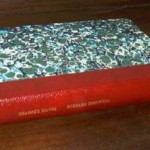Bernard Cornwell, Sharpe’s Escape
£65.00
The author of the swashbuckling Sharpe series of adventures fighting the French during the Napoleonic Wars, Bernard Cornwell is a premier writer of historical military adventures. This is one of only 85 numbered and signed copies in a special binding with an appreciation by award winning historical writer Patricia Finney.
Out of Stock

 Bernard Cornwell is the most prolific and best known author of historical adventure stories of his generation. His work is in the tradition of historical adventure established by G A Henty, C S Forester and his near contemporary George MacDonald Fraser. More than one critic has noted that the Sharpe adventures are like Hornblower on land. Richard Sharpe is a ranker and he uses his wit and charm to occasionally move in the higher echelons of society – much as a private detective does in say the Raymond Chandler mystery novels and his successors. This device allows Sharpe and his sidekick Harper to a kind of detective duo, to find things out, have some influence and to make alliances when favours need to repaid. But it is not just the machinations behind the scenes that Cornwell’s books are famous for; it is the action and rough and tumble on the battlefield (or sailing ship) that gets the adrenalin going.
Bernard Cornwell is the most prolific and best known author of historical adventure stories of his generation. His work is in the tradition of historical adventure established by G A Henty, C S Forester and his near contemporary George MacDonald Fraser. More than one critic has noted that the Sharpe adventures are like Hornblower on land. Richard Sharpe is a ranker and he uses his wit and charm to occasionally move in the higher echelons of society – much as a private detective does in say the Raymond Chandler mystery novels and his successors. This device allows Sharpe and his sidekick Harper to a kind of detective duo, to find things out, have some influence and to make alliances when favours need to repaid. But it is not just the machinations behind the scenes that Cornwell’s books are famous for; it is the action and rough and tumble on the battlefield (or sailing ship) that gets the adrenalin going.
Bernard Cornwell has written 21 books with Richard Sharpe and his colleagues serving against the French. Sharpe has bec ome a hero figure and the Sharpe Appreciation Society frequently has many hundreds in attendance at its annual convention. Sharpe’s Escape is set during the late summer of 1810 and the French mount their third and most threatening invasion of Portugal. Captain Richard Sharpe, with his company of redcoats and riflemen, meets the invaders on the gaunt ridge of Bussaco where, despite a stunning victory, the French are not stopped. Sharpe’s Escape slots between Sharpe’s Gold and Sharpe’s Battle. This edition contains an appreciation by award winning historical fiction and mystery writer Patricia Finney.
ome a hero figure and the Sharpe Appreciation Society frequently has many hundreds in attendance at its annual convention. Sharpe’s Escape is set during the late summer of 1810 and the French mount their third and most threatening invasion of Portugal. Captain Richard Sharpe, with his company of redcoats and riflemen, meets the invaders on the gaunt ridge of Bussaco where, despite a stunning victory, the French are not stopped. Sharpe’s Escape slots between Sharpe’s Gold and Sharpe’s Battle. This edition contains an appreciation by award winning historical fiction and mystery writer Patricia Finney.

 Dick Francis, Second Wind
Dick Francis, Second Wind
 Bernard Cornwell, Sharpe’s Havoc
Bernard Cornwell, Sharpe’s Havoc

Rating by Kirkus Reviews on May 15, 2012 :
“Cornwell’s excellent long-running Sharpe series (Sharpe’s Havoc, 2003, etc.) takes the soldiers’ soldier to real-life battles around Bussaco and Coimbra, Portugal.
Having imposed Napoleonic and imperial peace everywhere else in Europe, the Corsican monster has sent his troops to sew up what remains unconquered on the Iberian Peninsula. But, zut!, the Portuguese will not roll over. Lord Wellington – on his way to that Iron Dukedom – has dug in for the long haul, contrary to the French and occasional Portuguese belief that the English will cut and run for their ships when things get the least bit tough. Wellington’s forces have secretly constructed a series of forts and battlements that extend from the Tagus River to the Atlantic, completely protecting Lisbon and its monarch. He has also instituted a scorched earth policy throughout the countryside, ordering the destruction of every bit of food and provision that might allow the French to dig in and stay. While carrying out those orders near the university city of Coimbra, Captain Sharpe encounters the treacherous Ferreira brothers, one a turncoat officer, the other a hulking sadist with a thriving business in slaves and prostitutes. The Ferreiras have been caught with a stash they were planning to sell to the Frogs, and when Sharpe puts the supplies to the torch he incurs the murderous wrath of Ferragus, the criminal kingpin, a fury that will plague the captain every bit as much as the Emperor’s armies. Further complication comes from the awful Lieutenant Slingsby, a minor county boozer who cynically married the pregnant sister-in-law of Sharpe’s commanding officer and now expects to move into Sharpe’s position. Everything comes to a boil in Coimbra, where Ferragus has a warehouse secretly stuffed with enough supplies to keep the French fed for a good long siege of Lisbon and where Sharpe falls into a trap laid by the brute. He will emerge with the assistance of a clever Portuguese chum and a spunky English governess.
Another good one”.
Rating by Patricia Finney on May 15, 2012 :
An extract from the Appreciation by Patricia Finney
“With Cornwell I can relax. He gets the physical world right in all its complicated detail – and not just the world of the Napoleonic wars where Sharpe first blazed into life, but also Medieval France, Dark Age Britain, and 17th century London . .. Cornwell’s battle scenes are well beyond ‘right’ – they make you feel exhausted at all the hacking and slashing and carnage you’ve vicariously gone through, especially if, as often happens with a Sharpe story, you’ve had to stay up all night reading it. More importantly he gets the psychology right. People in the past had the same emotions, the same hormones as us but they emphatically didn’t think the same way we do. This is where you find the vignettes that bring a whole world into sharp (sorry) relief. Just to take a couple of examples at random – there’s the perfect and funny moment in Sharpe’s Triumph when the future Duke of Wellington is embarassed at himself for being too shy and buttoned-up to thank Sharpe for saving his life. Or the powerful scene at the start of Gallow’s Thief where the highwayman about to be hanged is wearing a nosegay and trying to be debonair – but his leg is juddering because he’s afraid. We feel the emotional truth and the psychological truth and they carry us along into a strange, frightening different world, just as we wanted when we bought the book. Related to this capacity is something I value so highly because I know how easy it is to fall into the opposite crime: Cornwell has the gift of lucidity. His prose is crystal clear and never dull, all the characters, major or minor, spring out at you. That matter-of-factness is twice as hard to get right when you are dealing with the exotica of the past and the irony is, if you do get it right, nobody will notice at all! All your readers will just feel that they were actually there and have no notion of the craftsmanship that goes into making the illusion. Cornwell’s prose lets his characters behave exactly as you feel sure they would”.